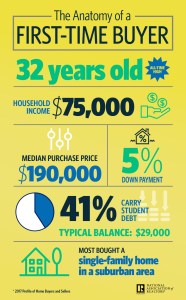If you’ve been waiting to buy a home, now may be your time to jump into the market. Maybe you’ve been wary of home prices, or concerned about mortgage rates. Maybe you’ve been attempting to “time the market” to get a good deal on a home. Regardless of your reason for waiting to buy a home, you shouldn’t ignore the current market conditions. It’s as if a perfect storm of home buying conditions is lining up to a great time to buy a home.
The big news is that mortgage interest rates continue to drop. National average mortgage rates have been declining since the fall, moving closer to the historic bottom! The May 30th U.S. weekly average for a thirty-year fixed rate mortgage provided by the Freddie Mac Primary Mortgage Market Survey(freddiemac.com) dropped to 3.99 percent. Mortgage News Daily’s Matthew Graham reported on June 3rd that mortgage rates dropped further (mortgagenewsdaily.com). Graham’s title “Mortgage Rates Continue to Plummet” is telling.
Although economists express confidence in the economy, they attribute the movement in mortgage interest rates to the current trade wars and bond market activity. The mortgage industry may also be anticipating a Fed rate cut at the next week’s meeting of the Open Market Committee.
Lower mortgage rates aren’t always a reason to take the plunge into the housing market. But what about moderating home sale prices? The FHFA Home Price Index (fhfa.gov) indicates that nationwide average home prices increased only 1.1 percent during the first quarter of 2019! Compared to the year-over-year 5.1 percent HPI increase, the modest first quarter gain may indicate a more affordable housing market. Locally, the Montgomery County year-over-year average home sale price only increased 0.2 percent, according to MarketStats by ShowingTime (getsmartcharts.com). However, the average price per square foot decreased 14.3 percent!
Another factor making it a great time buy a home is the lackluster spring home sales. Counter to what is expected, home sales have somewhat cooled during the spring. A May 30th NAR press release titled “Pending Home Sales Trail Off 1.5% in April” indicates that national home sales have been declining. In fact, the forward-looking indicator based on contract signings dropped 1.5 percent this past month. The total pending home sales in Montgomery County dropped about 2.8 percent compared to last spring.
There are increasingly more housing choices. Although housing supply remains tight, there were about 2.5 percent more new listings this April compared to the same time last year. Although many of these new listings go quickly, increasing new listings mean that there are more home sellers that are entering the market this year giving you more homes to consider.
Putting all the data points together signify a great time to buy a home. Housing affordability has increased, partly due in part by increasing family incomes, lower mortgage rates, and moderating home prices. Home sellers who are listing their homes for sale this spring are adjusting their sale price expectations. Homes that have been on the market for an extended time may be an opportunity for you to negotiate a lower sale price. According to mortgage experts, average mortgage rates have “plummeted,” giving you more flexibility and possibly lower housing costs.
These home buying conditions may not last very long. But before you decide to buy, determine if buying a home is the right choice by consulting a Realtor and other financial professionals.
Original located at https://dankrell.com/blog/2019/06/08/great-time-to-buy-a-home/
By Dan Krell
Copyright © 2019
If you like this post, do not copy; instead please:
link to the article
like it on facebook
or re-tweet.

Disclaimer. This article is not intended to provide nor should it be relied upon for legal and financial advice. Readers should not rely solely on the information contained herein, as it does not purport to be comprehensive or render specific advice. Readers should consult with an attorney regarding local real estate laws and customs as they vary by state and jurisdiction. Using this article without permission is a violation of copyright laws.




